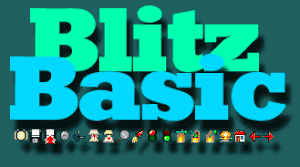Blitz BASIC
 |
|
| Developer(s) | Blitz Research Ltd. |
|---|---|
| Development status | Active |
| Written in | Compiled to C++, but the languages are dialects of BASIC |
| Operating system | IDE for Microsoft Windows, Mac OS X, Linux |
| Available in | English |
| Type | Game creation system |
| License | zlib license |
| Website | www |
| Paradigm | imperative, object-oriented, modular, reflective |
|---|---|
| Designed by | Mark Sibly |
| Developer | Blitz Research Ltd. |
| First appeared | 2004 |
| Stable release |
1.51 / 21 September 2015
|
| Typing discipline | Static, Weak, Strong (Optional) |
| OS | Microsoft Windows, Mac OS X, Linux |
| Website | www |
| Influenced by | |
| BlitzBasic | |
| Influenced | |
| Monkey | |
Blitz BASIC refers to the programming language dialect that was interpreted by the first Blitz compilers, devised by New Zealand-based developer Mark Sibly. Being derived from BASIC, Blitz syntax was designed to be easy to pick up for beginners first learning to program. The languages are game-programming oriented but are often found general-purpose enough to be used for most types of application. The Blitz language evolved as new products were released, with recent incarnations offering support for more advanced programming techniques such as object-orientation and multi-threading. This led to the languages losing their BASIC moniker in later years.
The first iteration of the Blitz language was created for the Amiga platform and published by the Australian firm Memory and Storage Technology. Returning to New Zealand, Blitz BASIC 2 was published several years later by Acid Software (a local Amiga game publisher). Since then, Blitz compilers have been released on several platforms. Following the demise of the Amiga as a commercially viable platform, the Blitz BASIC 2 source code was released to the Amiga community. Development continues to this day under the name AmiBlitz.
Idigicon published BlitzBasic for Microsoft Windows in October 2000. The language included a built-in API for performing basic 2D graphics and audio operations. Following the release of Blitz3D, BlitzBasic is often synonymously referred to as Blitz2D.
Recognition of BlitzBasic increased when a limited range of "free" versions were distributed in popular UK computer magazines such as PC Format. This resulted in a legal dispute between the developer and publisher which was eventually resolved amicably.
Blitz3D was released for Microsoft Windows in September 2001, competing with other similar PC game-development languages of the time (such as Dark Basic). Blitz3D extended BlitzBasic's command-set with the inclusion of an API for a DirectX 7-based 3D engine.
...
Wikipedia
